倒装句
图片预览


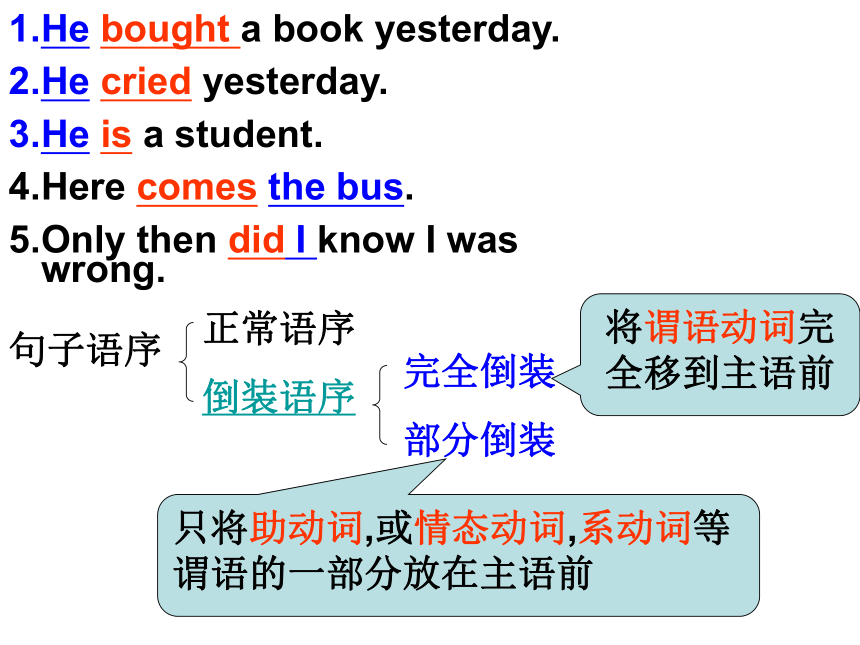
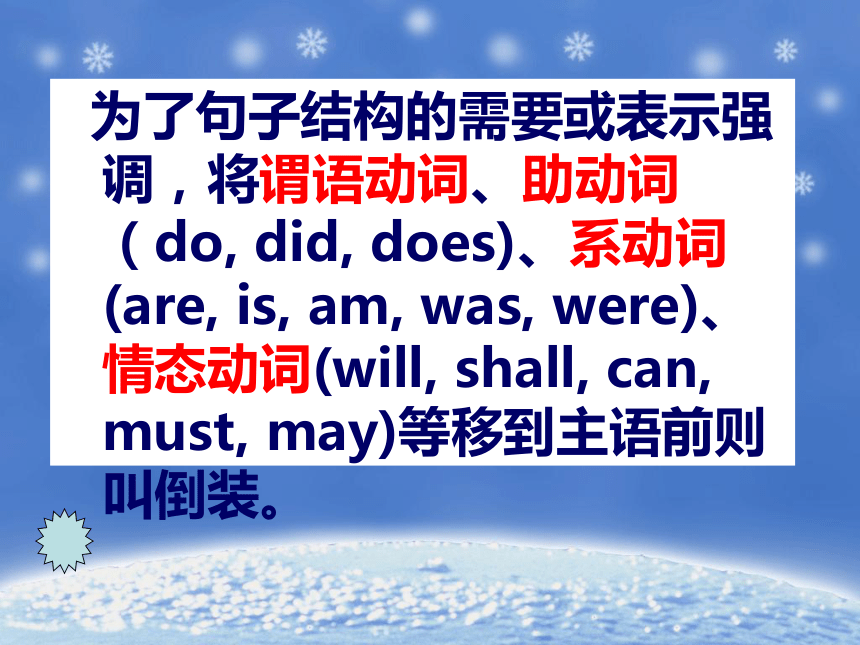
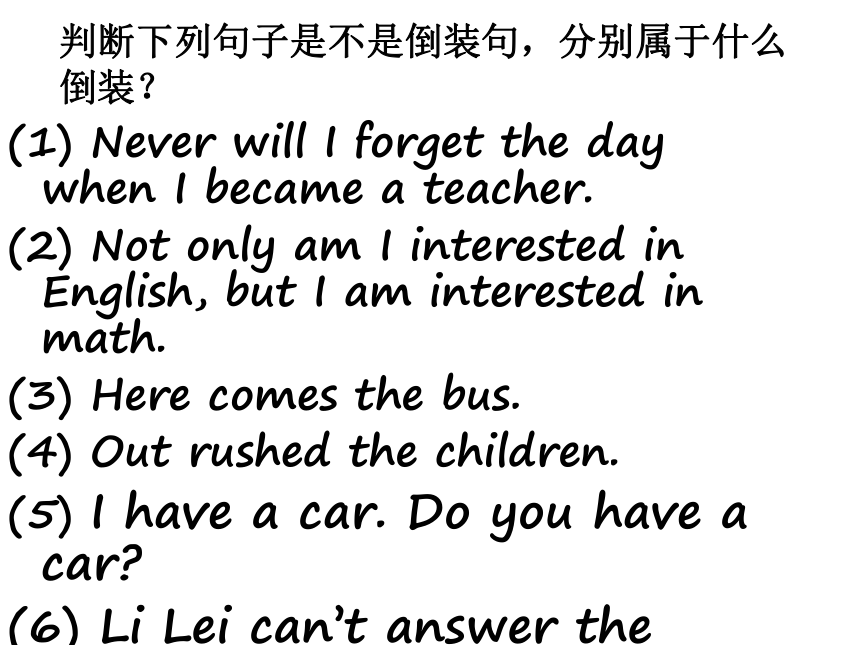
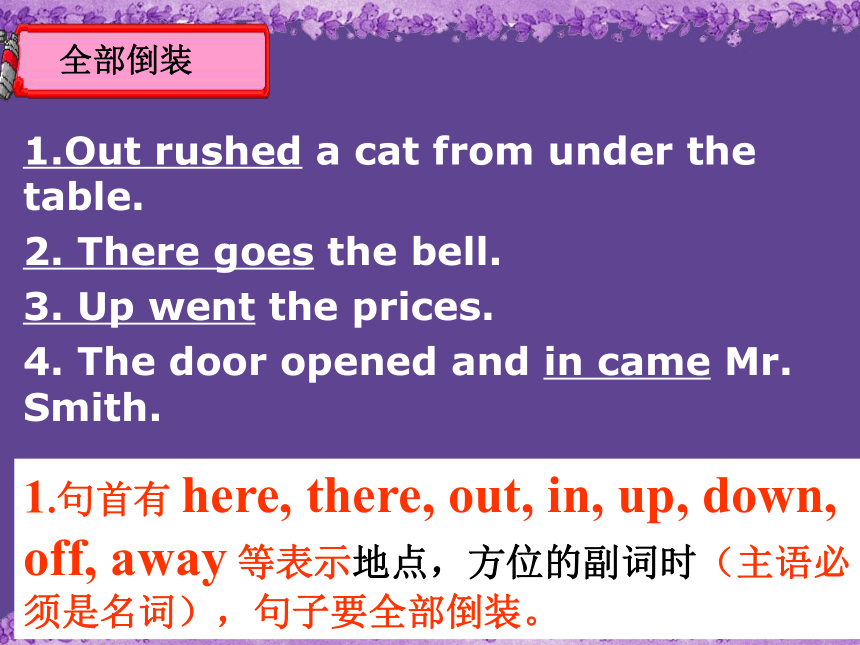
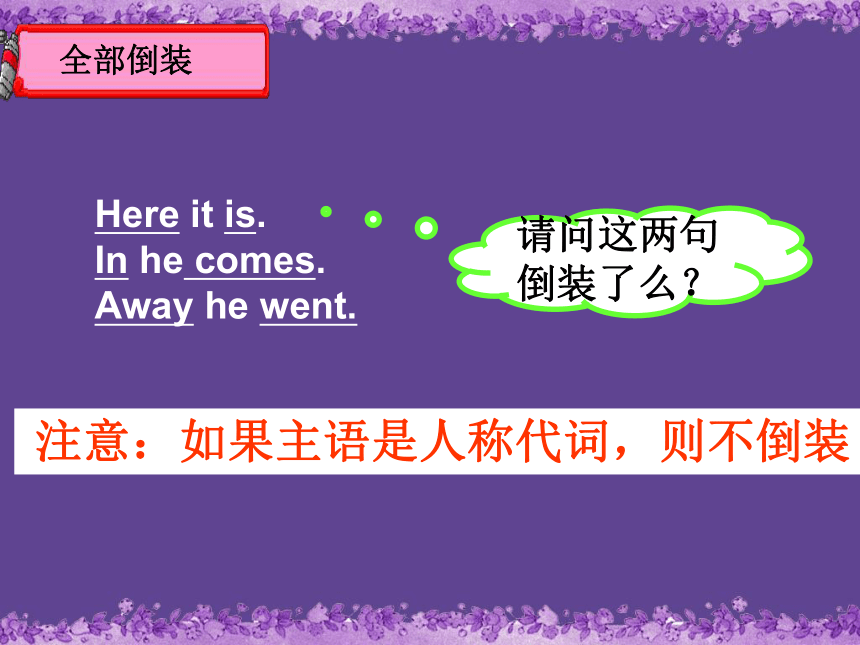
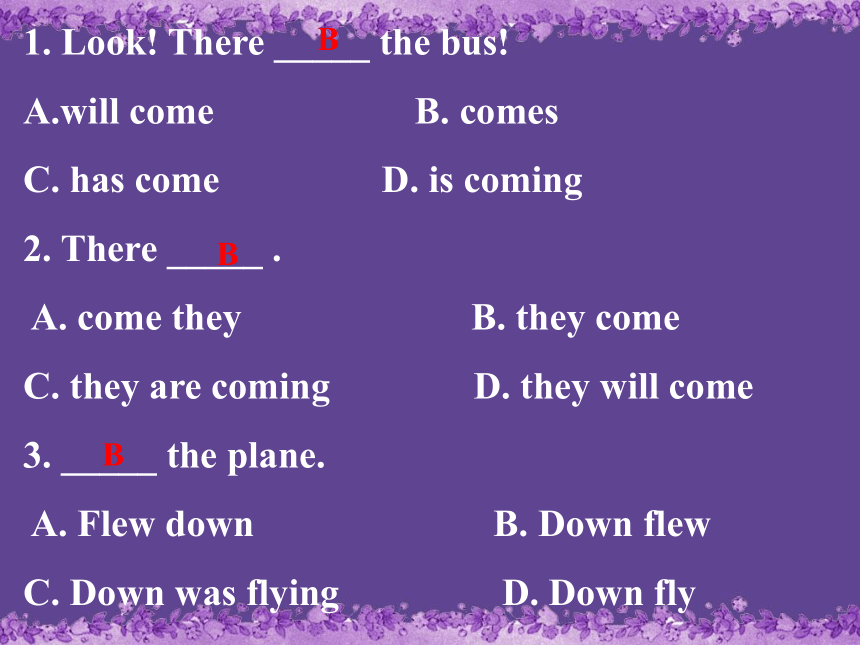
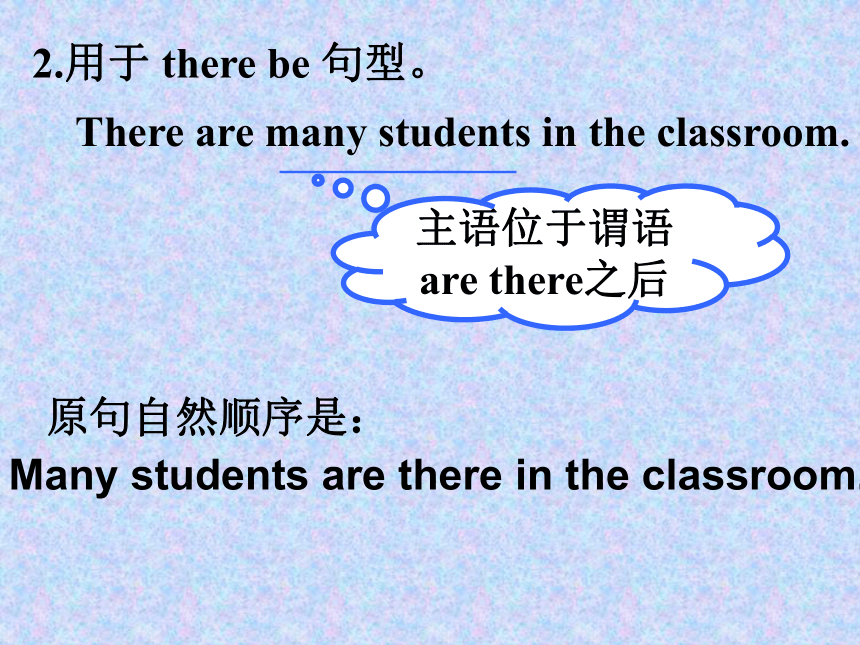
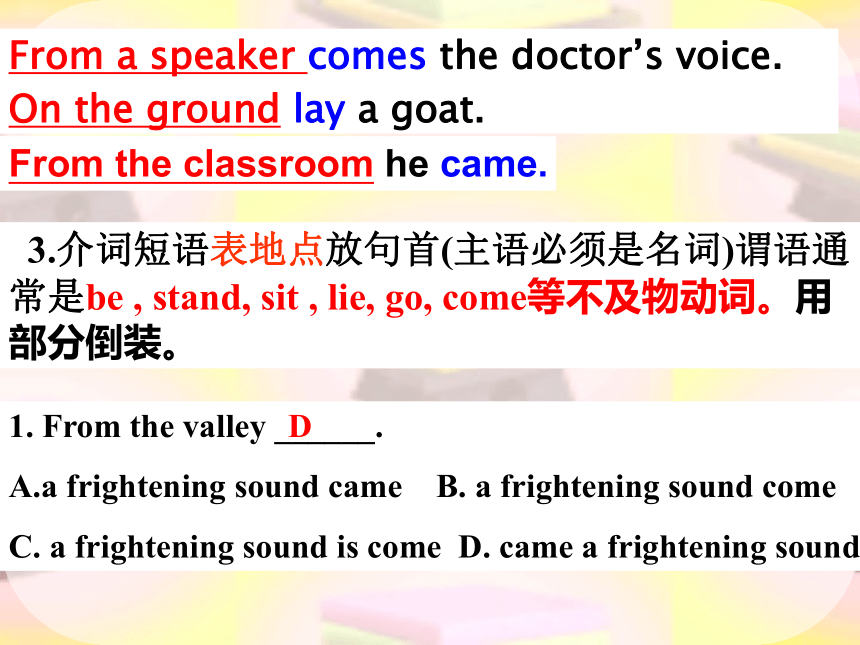
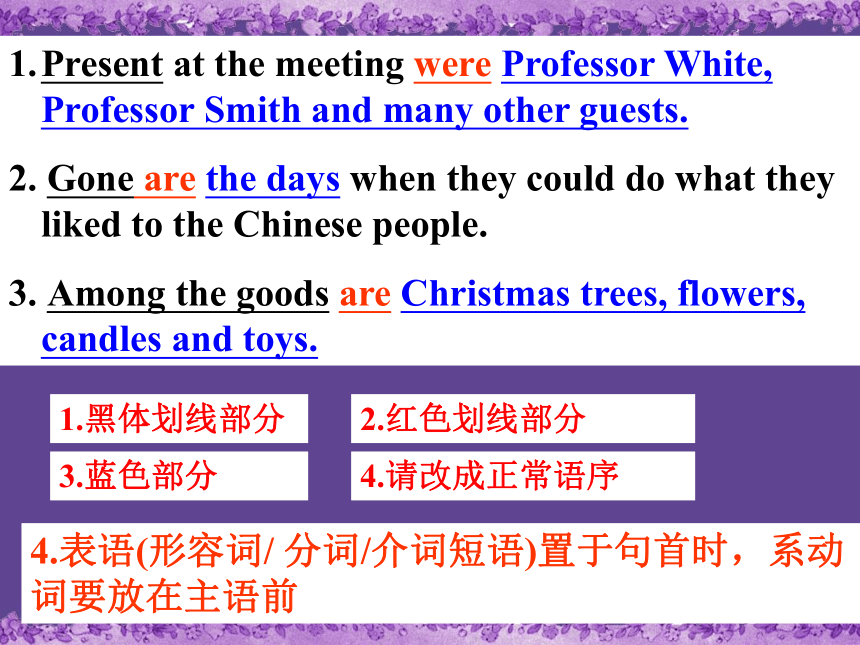
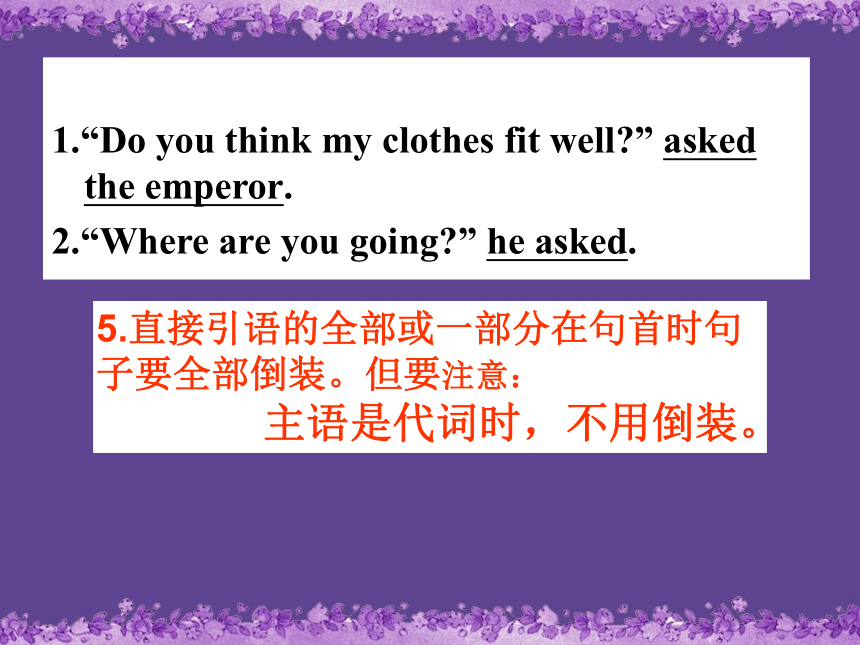
文档简介
课件40张PPT。WELCOMEINVERSION
倒装句句子语序正常语序
倒装语序
部分倒装He bought a book yesterday.
He cried yesterday.
He is a student.
Here comes the bus.
Only then did I know I was wrong.将谓语动词完全移到主语前只将助动词,或情态动词,系动词等谓语的一部分放在主语前
完全倒装 为了句子结构的需要或表示强调,将谓语动词、助动词(do, did, does)、系动词(are, is, am, was, were)、情态动词(will, shall, can, must, may)等移到主语前则叫倒装。(1) Never will I forget the day when I became a teacher.
(2) Not only am I interested in English, but I am interested in math.
(3) Here comes the bus.
(4) Out rushed the children.
(5) I have a car. Do you have a car?
(6) Li Lei can’t answer the question. Nor/ Neither can I.判断下列句子是不是倒装句,分别属于什么倒装?全部倒装1.Out rushed a cat from under the table.
2. There goes the bell.
3. Up went the prices.
4. The door opened and in came Mr. Smith. 1.句首有 here, there, out, in, up, down, off, away 等表示地点,方位的副词时(主语必须是名词),句子要全部倒装。全部倒装 注意:如果主语是人称代词,则不倒装请问这两句倒装了么?Here it is.
In he comes.
Away he went.1. Look! There _____ the bus!
will come B. comes
C. has come D. is coming
2. There _____ .
A. come they B. they come
C. they are coming D. they will come
3. _____ the plane.
A. Flew down B. Down flew
C. Down was flying D. Down fly BBB2.用于 there be 句型。
There are many students in the classroom.原句自然顺序是: Many students are there in the classroom.From a speaker comes the doctor’s voice.
On the ground lay a goat. 3.介词短语表地点放句首(主语必须是名词)谓语通常是be , stand, sit , lie, go, come等不及物动词。用部分倒装。1. From the valley ______.
a frightening sound came B. a frightening sound come
C. a frightening sound is come D. came a frightening soundDFrom the classroom he came.Present at the meeting were Professor White, Professor Smith and many other guests.
2. Gone are the days when they could do what they liked to the Chinese people.
3. Among the goods are Christmas trees, flowers, candles and toys.4.表语(形容词/ 分词/介词短语)置于句首时,系动词要放在主语前1.黑体划线部分3.蓝色部分2.红色划线部分4.请改成正常语序
1.“Do you think my clothes fit well?” asked the emperor.
2.“Where are you going?” he asked.5.直接引语的全部或一部分在句首时句子要全部倒装。但要注意:
主语是代词时,不用倒装。部分倒装 Do you speak English?
Was the People’s liberation Army found in 1927?1. 用于疑问句 Only then did I know I was wrong
Only in this way can you hope to improve
your English.
Only when the war was over in 1949 was he able to get back home.
Only he can do this work.
2.only修饰的副词、介词短语或状语从句放于句首时,主句要倒装.注:only 修饰主语(名词或者代词)时,不倒装.EXERCISESOnly in this way _____ do it well.
A. must we B. we could
C. can we D. we can
2. Only when class began _____ that he had left his book at home.
A. will he realize B. he did realize C. did he realize D. should he realizeCC1.He has finished his homework. So have I.
2.Jack can not answer the question. Neither can I.
3. He has been to Beijing. So have I.
He has been to Beijing. So he has.
4.It is hot today. So it is.
3.用于 so, nor, neither 开头的句子,用倒装表示前面的情况也适用于另一个人或事物的肯定或否定句当中。表示“也一样,也这样”如果后一个句子只是单纯的重复前面句子的意思,则不倒装。Tom likes singing, but he doesn’t like dancing.
Tom is clever and he studies hard.
当前面的句子中主语、谓语或肯否定形式不同时,用So it is with…So it is with Mary.So it is with Mary.EXERCISESI like sports and _____ my brother.
A. so does B. so is C. so can D. so likes
2. Helen doesn’t like milk and _____.
A. so I don’t B. so don’t I
C. either I do D. neither do I
3. – Did you enjoy that trip?
-- I’m afraid not. And _____
my brother don’t either B. my classmates don’t too
C. neither do my classmates D. neither did my classmatesADD4. – John won first prize in the contest. -- _____.
so he did B. so did he
C. so he did too D. so did he, too
5. -- I like football, I don’t like volleyball.
-- _____.
So do I. B. Neither do i.
C. So it is with me. D. So is it with me.
6. –David has made great progress recently. -- _____ , and _____. A. So he has; so you have B. So he has; so have you C. So has he; so have you D. So has he; so you have ACB 1. Seldom in all my life have I met such a determined
person.
2. Never shall I forget it.
3. Hardly can I believe that.
4. Little did Betty know that she was seriously ill herself.
5. Not only did he make a plan, but also he carried it out.
6. Not until the early years of the 19th century did man
know what heat is.
7. No sooner had he finished his talk than he was
surrounded by the workers.4.在下列否定或半否定副词, 连词,词组放句首作状语表示强调时。never, hardly, seldom, rarely, few, little, nowhere, by no means, at no time, in no way(决不), not a(不只一个),in no case(在任何情况下)
Hardly/Scarcely/barely …when, No sooner… than,(只倒主句,主句一般用过去完成时态而从句用一般过去时态。) 1. Neither has he called on her, nor will he do so.2. Not only was there no electricity, but also there was no water.
neither… nor…(两个都倒)not only…(只倒前面)但是当连接主语时不倒装
Not only he but also I have kept the secret.
Not until he told me about it did I realize that I was wrong.4. Hardly …when, No sooner… than,(只倒主句,主句一般用过去完成时态而从句用一般过去时态。)1.Hardly had we started when it began to rain.
2.No sooner had he got his office than he got down to work.3.Not until…只倒装主句EXERCISES1. Not until I began to work _____ how much time I had wasted.
A. didn’t I realize B. did I realize C. I didn’t realize D. I realize
2. Nowhere else in the world _____ cheaper tailoring than in Hong Kong. A. a tourist can find B. can a tourist find C. a tourist will find D. a tourist has found
3. _____ sat down for a rest _____ the door bell rang. A. Hardly I has; when B. Hardly I had; than C. Hardly had I ; than D. Hardly had I ; whenBBDPretty as she is, she is not clever.
2. Hard as he studied, he might fail again.
3. Child as he was, he had to make a living.8.as/though引导的让步状语从句要用倒装语序n(不带冠词)/adj/ adv+ as + 主语 + be/情态动词单数可数名词作表语提前不用冠词As she is pretty, she is not clever.
As he studied hard, he might fail again.
As he was a child, he had to make a living.1. So loudly did he speak that even people in the next room could hear him.
2. Such a good job did she do that everyone felt proud of her.6.so…that/ such…that中 so+ adj./adv或such…提前到句首时,要用部分倒装.1. He spoke so loudly that even people in the next room could hear him.
2. She did such a good job that everyone felt proud of her.用于虚拟语气中 If 引导的虚拟条件句, 可省略if, 把should, had 或 were 放在主语前.1.Should it rain, the crops would grow better.
2.Were I your father, I would not give you the money.
3.Had you reviewed your lessons, you might have passed the exam.1.If it should rain, the crops would grow better. (对将来)
2.If I were your father, I would not give you the money. (对现在)
3.If you had reviewed your lessons, you might have passed the exam. (对过去) 1.______ for the free tickets,I would not have gone to the films so often.
A.If it is not B.Were it not
C.Had it not been D.If they were notC1. Often did I speak of him before.
2. Many a time has he helped me with my experiment.7.在以often, always, once, many a time, now and then, every other day, 等作状语的频度副词位于句首时,要用部分倒装。EXERCISESLook! _____ .
Out the girl went B. went the girl out
C. Away went the girl D. Away the girl went
2. Under a big tree ____, half asleep.
A did sat a fat man B a fat man sat
C did a fat man sat D sat a fat man
3. She plays the piano very well._________. A So every one of us does B Every one of us does
C So does every one of us D So do every one of us CDC4. Never _____such a wonderful place as Hangzhou. A are hanging B had I seen C I have seen D have I seen
5. Not only ____a promise, but also he kept it. A has he made B does he make C he made D did he make
6. Not until he got off the bus _____that he had got his wallet stolen.
A he found B did he find C he had found D had he found
7. Only in this way _____progress in your English. A you make B can you make C you be able to make D will you able to make
8. _____and caught the mouse.
A Up the cat jumped B The cat up jumped C Up jumped the cat D Jumped up the catDDBBC9. -- Where is your father?
-- Oh,_______.
A here he comes B he here comes
C here does he come D here comes he
10.____in which they had came to the island. A Nearby were two canoes B Nearby two canoes were
C Were two canoes nearby D Two canoes nearby were
11. The door opened and there ____.
A enters an old man B entered an old man C did an old man enter D an old man enteredAAB12. Little ___ when I took the trip and ___ did my brother.
A. have I known; so B. had I know;neither
C. do I know; so D. did I know; neither
13. Many a time __ to see me while __ in hospital.
A. did he come; was I B. did he come; I was
C. he came; was I D. he was; I was
14. She is not fond of cooking.____ I.
A. So am B. Nor am
C. Neither do I D. Nor doDBB15. At the foot of the mountain_____.
A lie a beautiful lake B does a beautiful lake lie
C lies a beautiful lake D do a beautiful lake lie
16. At no time ___ his personal interest first.
should a communist place
B. a communist should place
C. a communist place
D. does a communist place
17. On the wall ______two large pictures. A are hanging B hanged C hang D hangs CAC18.? I finally got the job I dreamed about. Never in my life ____so happy!
A.did I feel B.I felt C.I had felt D.had I felt
19.Little ___about his own safety,though he was in great danger himself.
A. does he care B. did he care C. he cares D. he cared
20. Not only ______ polluted but ______ crowded.
A. was the city;were the streets
B.the city was;were the streets
C.was the city;the streets were
D.the city was;the streets wereDBC24.Hardly_______ when it began to rain.
A. had he arrived B. arrived he
C. he had arrived D. did he arrive
25.Mr. Smith promised to help me and___ the next day.
A. neither he did B. so he did
C. neither did he D. so did he
26.Not until the bell rang____in.
A. do they come B. came they
C. did they come D. they cameABCconclusion全部倒装
副词、介词短语开头,动词常见的有:be lie stand sit go come部分倒装:
① 否定词(半否定词 )在句首,常见的有:never hardly scarcely seldom little barely rarely
few little not until not only neither nor
Hardly…when No sooner…than②only + 状语在句首
③ 表语+ as + 主语+ be HOMEWORK学案练习page18 IITHANK YOU BYE BYE
倒装句句子语序正常语序
倒装语序
部分倒装He bought a book yesterday.
He cried yesterday.
He is a student.
Here comes the bus.
Only then did I know I was wrong.将谓语动词完全移到主语前只将助动词,或情态动词,系动词等谓语的一部分放在主语前
完全倒装 为了句子结构的需要或表示强调,将谓语动词、助动词(do, did, does)、系动词(are, is, am, was, were)、情态动词(will, shall, can, must, may)等移到主语前则叫倒装。(1) Never will I forget the day when I became a teacher.
(2) Not only am I interested in English, but I am interested in math.
(3) Here comes the bus.
(4) Out rushed the children.
(5) I have a car. Do you have a car?
(6) Li Lei can’t answer the question. Nor/ Neither can I.判断下列句子是不是倒装句,分别属于什么倒装?全部倒装1.Out rushed a cat from under the table.
2. There goes the bell.
3. Up went the prices.
4. The door opened and in came Mr. Smith. 1.句首有 here, there, out, in, up, down, off, away 等表示地点,方位的副词时(主语必须是名词),句子要全部倒装。全部倒装 注意:如果主语是人称代词,则不倒装请问这两句倒装了么?Here it is.
In he comes.
Away he went.1. Look! There _____ the bus!
will come B. comes
C. has come D. is coming
2. There _____ .
A. come they B. they come
C. they are coming D. they will come
3. _____ the plane.
A. Flew down B. Down flew
C. Down was flying D. Down fly BBB2.用于 there be 句型。
There are many students in the classroom.原句自然顺序是: Many students are there in the classroom.From a speaker comes the doctor’s voice.
On the ground lay a goat. 3.介词短语表地点放句首(主语必须是名词)谓语通常是be , stand, sit , lie, go, come等不及物动词。用部分倒装。1. From the valley ______.
a frightening sound came B. a frightening sound come
C. a frightening sound is come D. came a frightening soundDFrom the classroom he came.Present at the meeting were Professor White, Professor Smith and many other guests.
2. Gone are the days when they could do what they liked to the Chinese people.
3. Among the goods are Christmas trees, flowers, candles and toys.4.表语(形容词/ 分词/介词短语)置于句首时,系动词要放在主语前1.黑体划线部分3.蓝色部分2.红色划线部分4.请改成正常语序
1.“Do you think my clothes fit well?” asked the emperor.
2.“Where are you going?” he asked.5.直接引语的全部或一部分在句首时句子要全部倒装。但要注意:
主语是代词时,不用倒装。部分倒装 Do you speak English?
Was the People’s liberation Army found in 1927?1. 用于疑问句 Only then did I know I was wrong
Only in this way can you hope to improve
your English.
Only when the war was over in 1949 was he able to get back home.
Only he can do this work.
2.only修饰的副词、介词短语或状语从句放于句首时,主句要倒装.注:only 修饰主语(名词或者代词)时,不倒装.EXERCISESOnly in this way _____ do it well.
A. must we B. we could
C. can we D. we can
2. Only when class began _____ that he had left his book at home.
A. will he realize B. he did realize C. did he realize D. should he realizeCC1.He has finished his homework. So have I.
2.Jack can not answer the question. Neither can I.
3. He has been to Beijing. So have I.
He has been to Beijing. So he has.
4.It is hot today. So it is.
3.用于 so, nor, neither 开头的句子,用倒装表示前面的情况也适用于另一个人或事物的肯定或否定句当中。表示“也一样,也这样”如果后一个句子只是单纯的重复前面句子的意思,则不倒装。Tom likes singing, but he doesn’t like dancing.
Tom is clever and he studies hard.
当前面的句子中主语、谓语或肯否定形式不同时,用So it is with…So it is with Mary.So it is with Mary.EXERCISESI like sports and _____ my brother.
A. so does B. so is C. so can D. so likes
2. Helen doesn’t like milk and _____.
A. so I don’t B. so don’t I
C. either I do D. neither do I
3. – Did you enjoy that trip?
-- I’m afraid not. And _____
my brother don’t either B. my classmates don’t too
C. neither do my classmates D. neither did my classmatesADD4. – John won first prize in the contest. -- _____.
so he did B. so did he
C. so he did too D. so did he, too
5. -- I like football, I don’t like volleyball.
-- _____.
So do I. B. Neither do i.
C. So it is with me. D. So is it with me.
6. –David has made great progress recently. -- _____ , and _____. A. So he has; so you have B. So he has; so have you C. So has he; so have you D. So has he; so you have ACB 1. Seldom in all my life have I met such a determined
person.
2. Never shall I forget it.
3. Hardly can I believe that.
4. Little did Betty know that she was seriously ill herself.
5. Not only did he make a plan, but also he carried it out.
6. Not until the early years of the 19th century did man
know what heat is.
7. No sooner had he finished his talk than he was
surrounded by the workers.4.在下列否定或半否定副词, 连词,词组放句首作状语表示强调时。never, hardly, seldom, rarely, few, little, nowhere, by no means, at no time, in no way(决不), not a(不只一个),in no case(在任何情况下)
Hardly/Scarcely/barely …when, No sooner… than,(只倒主句,主句一般用过去完成时态而从句用一般过去时态。) 1. Neither has he called on her, nor will he do so.2. Not only was there no electricity, but also there was no water.
neither… nor…(两个都倒)not only…(只倒前面)但是当连接主语时不倒装
Not only he but also I have kept the secret.
Not until he told me about it did I realize that I was wrong.4. Hardly …when, No sooner… than,(只倒主句,主句一般用过去完成时态而从句用一般过去时态。)1.Hardly had we started when it began to rain.
2.No sooner had he got his office than he got down to work.3.Not until…只倒装主句EXERCISES1. Not until I began to work _____ how much time I had wasted.
A. didn’t I realize B. did I realize C. I didn’t realize D. I realize
2. Nowhere else in the world _____ cheaper tailoring than in Hong Kong. A. a tourist can find B. can a tourist find C. a tourist will find D. a tourist has found
3. _____ sat down for a rest _____ the door bell rang. A. Hardly I has; when B. Hardly I had; than C. Hardly had I ; than D. Hardly had I ; whenBBDPretty as she is, she is not clever.
2. Hard as he studied, he might fail again.
3. Child as he was, he had to make a living.8.as/though引导的让步状语从句要用倒装语序n(不带冠词)/adj/ adv+ as + 主语 + be/情态动词单数可数名词作表语提前不用冠词As she is pretty, she is not clever.
As he studied hard, he might fail again.
As he was a child, he had to make a living.1. So loudly did he speak that even people in the next room could hear him.
2. Such a good job did she do that everyone felt proud of her.6.so…that/ such…that中 so+ adj./adv或such…提前到句首时,要用部分倒装.1. He spoke so loudly that even people in the next room could hear him.
2. She did such a good job that everyone felt proud of her.用于虚拟语气中 If 引导的虚拟条件句, 可省略if, 把should, had 或 were 放在主语前.1.Should it rain, the crops would grow better.
2.Were I your father, I would not give you the money.
3.Had you reviewed your lessons, you might have passed the exam.1.If it should rain, the crops would grow better. (对将来)
2.If I were your father, I would not give you the money. (对现在)
3.If you had reviewed your lessons, you might have passed the exam. (对过去) 1.______ for the free tickets,I would not have gone to the films so often.
A.If it is not B.Were it not
C.Had it not been D.If they were notC1. Often did I speak of him before.
2. Many a time has he helped me with my experiment.7.在以often, always, once, many a time, now and then, every other day, 等作状语的频度副词位于句首时,要用部分倒装。EXERCISESLook! _____ .
Out the girl went B. went the girl out
C. Away went the girl D. Away the girl went
2. Under a big tree ____, half asleep.
A did sat a fat man B a fat man sat
C did a fat man sat D sat a fat man
3. She plays the piano very well._________. A So every one of us does B Every one of us does
C So does every one of us D So do every one of us CDC4. Never _____such a wonderful place as Hangzhou. A are hanging B had I seen C I have seen D have I seen
5. Not only ____a promise, but also he kept it. A has he made B does he make C he made D did he make
6. Not until he got off the bus _____that he had got his wallet stolen.
A he found B did he find C he had found D had he found
7. Only in this way _____progress in your English. A you make B can you make C you be able to make D will you able to make
8. _____and caught the mouse.
A Up the cat jumped B The cat up jumped C Up jumped the cat D Jumped up the catDDBBC9. -- Where is your father?
-- Oh,_______.
A here he comes B he here comes
C here does he come D here comes he
10.____in which they had came to the island. A Nearby were two canoes B Nearby two canoes were
C Were two canoes nearby D Two canoes nearby were
11. The door opened and there ____.
A enters an old man B entered an old man C did an old man enter D an old man enteredAAB12. Little ___ when I took the trip and ___ did my brother.
A. have I known; so B. had I know;neither
C. do I know; so D. did I know; neither
13. Many a time __ to see me while __ in hospital.
A. did he come; was I B. did he come; I was
C. he came; was I D. he was; I was
14. She is not fond of cooking.____ I.
A. So am B. Nor am
C. Neither do I D. Nor doDBB15. At the foot of the mountain_____.
A lie a beautiful lake B does a beautiful lake lie
C lies a beautiful lake D do a beautiful lake lie
16. At no time ___ his personal interest first.
should a communist place
B. a communist should place
C. a communist place
D. does a communist place
17. On the wall ______two large pictures. A are hanging B hanged C hang D hangs CAC18.? I finally got the job I dreamed about. Never in my life ____so happy!
A.did I feel B.I felt C.I had felt D.had I felt
19.Little ___about his own safety,though he was in great danger himself.
A. does he care B. did he care C. he cares D. he cared
20. Not only ______ polluted but ______ crowded.
A. was the city;were the streets
B.the city was;were the streets
C.was the city;the streets were
D.the city was;the streets wereDBC24.Hardly_______ when it began to rain.
A. had he arrived B. arrived he
C. he had arrived D. did he arrive
25.Mr. Smith promised to help me and___ the next day.
A. neither he did B. so he did
C. neither did he D. so did he
26.Not until the bell rang____in.
A. do they come B. came they
C. did they come D. they cameABCconclusion全部倒装
副词、介词短语开头,动词常见的有:be lie stand sit go come部分倒装:
① 否定词(半否定词 )在句首,常见的有:never hardly scarcely seldom little barely rarely
few little not until not only neither nor
Hardly…when No sooner…than②only + 状语在句首
③ 表语+ as + 主语+ be HOMEWORK学案练习page18 IITHANK YOU BYE BYE
